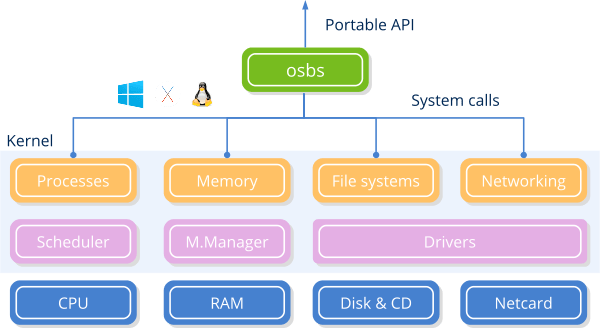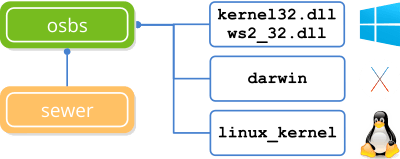Osbs
This page has been automatically translated using the Google Translate API services. We are working on improving texts. Thank you for your understanding and patience.
There is no neat distinction between operating system software and the software that runs on top of it. Jim Allchin
Functions
| uint32_t | (*FPtr_thread_main (...)) |
| void | osbs_start (void) |
| void | osbs_finish (void) |
| platform_t | osbs_platform (void) |
| win_t | osbs_windows (void) |
| endian_t | osbs_endian (void) |
Types and Constants
| enum | platform_t |
| enum | device_t |
| enum | win_t |
| enum | endian_t |
| enum | week_day_t |
| enum | month_t |
| enum | file_type_t |
| enum | file_mode_t |
| enum | file_seek_t |
| enum | ferror_t |
| enum | perror_t |
| enum | serror_t |
| struct | Date |
| struct | Dir |
| struct | File |
| struct | Mutex |
| struct | Proc |
| struct | DLib |
| struct | Thread |
| struct | Socket |
osbs (Operating System Basic Services) is a portable wrapper that allows applications to communicate with the operating system core at the level of processes, memory, files and networks. This communication is carried out through a series of system calls (Figure 1) which vary according to the operating system for which we are programming. It is the non-graphic lowest level API to communicate with hardware devices and access the machine resources. Below are the device drivers managed directly by the kernel, to which applications have access denied.

Darwin, the macOS kernel, and Linux are Unix-like systems, therefore, they share the same system calls (with subtle differences). But Windows presents a radically different architecture and function set. The NAppGUI osbs library is nothing more than a small wrapper that internally handles these differences and provides a common way to access the same resources on different platforms (Figure 2). It only depends on Sewer and its functionalities have been divided into different modules:
- Processes, Threads, Mutual exclusion.
- Loading libraries.
- Files and directories.
- Sockets.
- Time.

enum platform_t
Operating systems supported by NAppGUI.
enum platform_t
{
ekWINDOWS,
ekMACOS,
ekLINUX,
ekIOS
};
| ekWINDOWS | Microsoft Windows. |
| ekMACOS | Apple macOS. |
| ekLINUX | GNU/Linux. |
| ekIOS | Apple iOS. |
enum device_t
Device type.
enum device_t
{
ekDESKTOP,
ekPHONE,
ekTABLET
};
| ekDESKTOP | Desktop or laptop computer. |
| ekPHONE | Phone. |
| ekTABLET | Tablet. |
enum win_t
Microsoft Windows versions.
enum win_t
{
ekWIN_9x,
ekWIN_NT4,
ekWIN_2K,
ekWIN_XP,
ekWIN_XP1,
ekWIN_XP2,
ekWIN_XP3,
ekWIN_VI,
ekWIN_VI1,
ekWIN_VI2,
ekWIN_7,
ekWIN_71,
ekWIN_8,
ekWIN_81,
ekWIN_10,
ekWIN_NO
};
| ekWIN_9x | Windows 95, 98 or ME. |
| ekWIN_NT4 | Windows NT4. |
| ekWIN_2K | Windows 2000. |
| ekWIN_XP | Windows XP. |
| ekWIN_XP1 | Windows XP Service Pack 1. |
| ekWIN_XP2 | Windows XP Service Pack 2. |
| ekWIN_XP3 | Windows XP Service Pack 3. |
| ekWIN_VI | Windows Vista. |
| ekWIN_VI1 | Windows Vista Service Pack 1. |
| ekWIN_VI2 | Windows Vista Service Pack 2. |
| ekWIN_7 | Windows 7. |
| ekWIN_71 | Windows 7 Service Pack 1. |
| ekWIN_8 | Windows 8. |
| ekWIN_81 | Windows 8 Service Pack 1. |
| ekWIN_10 | Windows 10. |
| ekWIN_NO | The system is not Windows. |
enum endian_t
Represents the Byte order, or how multi-byte data is stored in memory.
enum endian_t
{
ekLITEND,
ekBIGEND
};
| ekLITEND | Little endian. The lowest byte first. |
| ekBIGEND | Big endian. The highest byte first. |
enum week_day_t
Weekday.
enum week_day_t
{
ekSUNDAY,
ekMONDAY,
ekTUESDAY,
ekWEDNESDAY,
ekTHURSDAY,
ekFRIDAY,
ekSATURDAY
};
| ekSUNDAY | Sunday. |
| ekMONDAY | Monday. |
| ekTUESDAY | Tuesday. |
| ekWEDNESDAY | Wednesday. |
| ekTHURSDAY | Thursday. |
| ekFRIDAY | Friday. |
| ekSATURDAY | Saturday. |
enum month_t
Month.
enum month_t
{
ekJANUARY,
ekFEBRUARY,
ekMARCH,
ekAPRIL,
ekMAY,
ekJUNE,
ekJULY,
ekAUGUST,
ekSEPTEMBER,
ekOCTOBER,
ekNOVEMBER,
ekDECEMBER
};
| ekJANUARY | January. |
| ekFEBRUARY | February. |
| ekMARCH | March. |
| ekAPRIL | April. |
| ekMAY | May. |
| ekJUNE | June. |
| ekJULY | July. |
| ekAUGUST | August. |
| ekSEPTEMBER | September. |
| ekOCTOBER | October. |
| ekNOVEMBER | November. |
| ekDECEMBER | December. |
enum file_type_t
File type.
enum file_type_t
{
ekARCHIVE,
ekDIRECTORY,
ekOTHERFILE
};
| ekARCHIVE | Ordinary file. |
| ekDIRECTORY | Directory. |
| ekOTHERFILE | Another type of file reserved for the operating system (devices, pipes, etc.) |
enum file_mode_t
Different ways to open a file.
enum file_mode_t
{
ekREAD,
ekWRITE,
ekAPPEND
};
| ekREAD | Read only. |
| ekWRITE | Read and write. |
| ekAPPEND | Writing at the end of the file. |
enum file_seek_t
Initial position of the pointer in bfile_seek.
enum file_seek_t
{
ekSEEKSET,
ekSEEKCUR,
ekSEEKEND
};
| ekSEEKSET | Start of file. |
| ekSEEKCUR | Current pointer position. |
| ekSEEKEND | End of file. |
enum ferror_t
Error codes manipulating files.
enum ferror_t
{
ekFEXISTS,
ekFNOPATH,
ekFNOFILE,
ekFBIGNAME,
ekFNOFILES,
ekFNOEMPTY,
ekFNOACCESS,
ekFLOCK,
ekFBIG,
ekFSEEKNEG,
ekFUNDEF,
ekFOK
};
| ekFEXISTS | The file already exists. |
| ekFNOPATH | The directory does not exist. |
| ekFNOFILE | The file does not exists. |
| ekFBIGNAME | The name of the file exceeds the capacity of the buffer to store it. |
| ekFNOFILES | There are no more files when we travel through a directory. bfile_dir_get. |
| ekFNOEMPTY | You are trying to delete a non-empty directory. hfile_dir_destroy. |
| ekFNOACCESS | The file can not be accessed (possibly due to lack of permissions). |
| ekFLOCK | The file is being used by another process. |
| ekFBIG | The file is so big. It may appear in functions that can not handle files larger than 4Gb. |
| ekFSEEKNEG | Negative position within a file. See bfile_seek. |
| ekFUNDEF | There is no more information about the error. |
| ekFOK | There is no error. |
enum perror_t
Error codes working with processes.
enum perror_t
{
ekPPIPE,
ekPEXEC,
ekPOK
};
| ekPPIPE | Error in the standard I/O channel. |
| ekPEXEC | Error when launching the process. Surely the command is invalid. |
| ekPOK | There is no error. |
enum serror_t
Error code in network communications.
enum serror_t
{
ekSNONET,
ekSNOHOST,
ekSTIMEOUT,
ekSSTREAM,
ekSUNDEF,
ekSOK
};
| ekSNONET | There is no Internet connection on the device. |
| ekSNOHOST | Unable to connect to the remote server. |
| ekSTIMEOUT | The maximum wait time for the connection has been exceeded. |
| ekSSTREAM | Error in the I/O channel when reading or writing. |
| ekSUNDEF | There is no more information about the error. |
| ekSOK | There is no error. |
struct Date
Public structure that contains the fields of a time stamp (date + time) for direct access.
struct Date { int16_t year; uint8_t month; uint8_t wday; uint8_t mday; uint8_t hour; uint8_t minute; uint8_t second; };
| year | Year. |
| month | The month (1-12). month_t. |
| wday | The day of the week (0-6). week_day_t. |
| mday | The day of the month (1-31). |
| hour | The hour (0-23). |
| minute | The minute (0-59). |
| second | The second (0-59). |
struct Dir
Represents an open directory, by which you can browse. bfile_dir_open.
struct Dir;
struct File
File handler on disk. bfile_open.
struct File;
struct Mutex
Mutual exclusion mechanism ( mutex) used to control concurrent access to a resource. Locks.
struct Mutex;
struct Proc
Represents a running process, with which the main program can communicate using the standard I/O channels. bproc_exec.
struct Proc;
struct DLib
Represents a dynamically loaded library in the process. dlib_open.
struct DLib;
struct Thread
Represents a thread of execution, launched from the main process. bthread_create.
struct Thread;
struct Socket
Handler of network connection. bsocket_connect.
struct Socket;
FPtr_thread_main
Prototype of a thread start function (thread main). bthread_create.
uint32_t (*FPtr_thread_main)(type *data);
| data | Data passed to the thread main function. |
Return
The thread return value.
osbs_start ()
Start osbs library, reserving space for global internal structures.
void
osbs_start(void);
osbs_finish ()
Ends osbs library, freeing space from global internal structures.
void
osbs_finish(void);
osbs_platform ()
Get the operating system in which the application is running.
platform_t osbs_platform(void);
Return
The platform.
osbs_windows ()
Get the Windows version.
win_t osbs_windows(void);
Return
The Microsoft Windows version.
osbs_endian ()
Get the Byte order of the running platform.
endian_t osbs_endian(void);
Return
The byte order of multi-byte data types.


